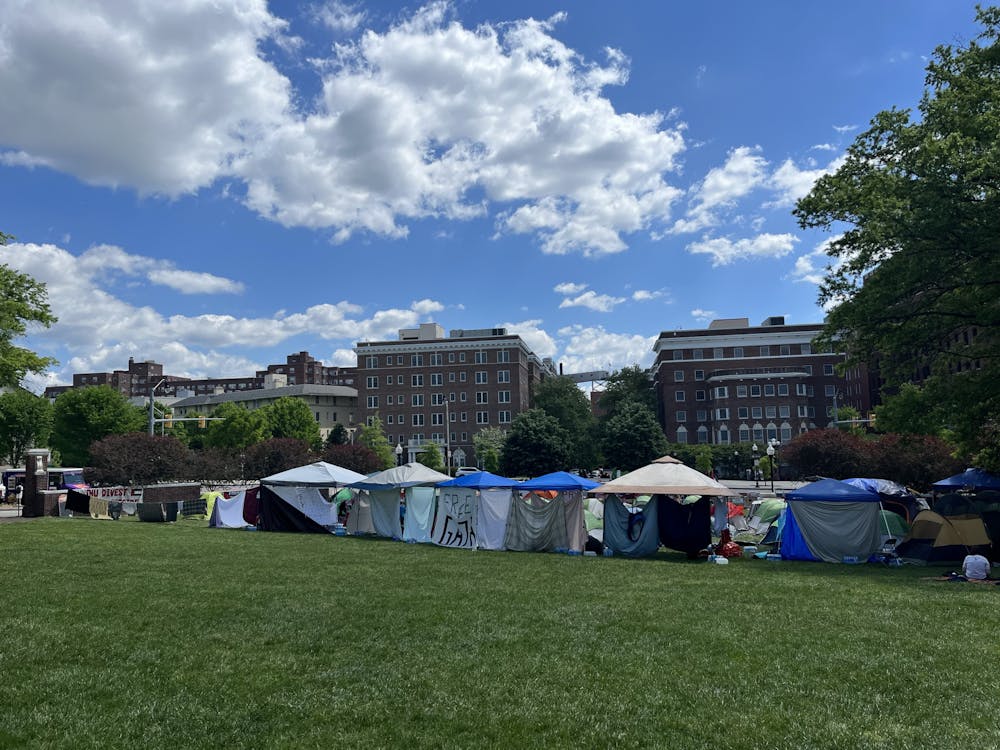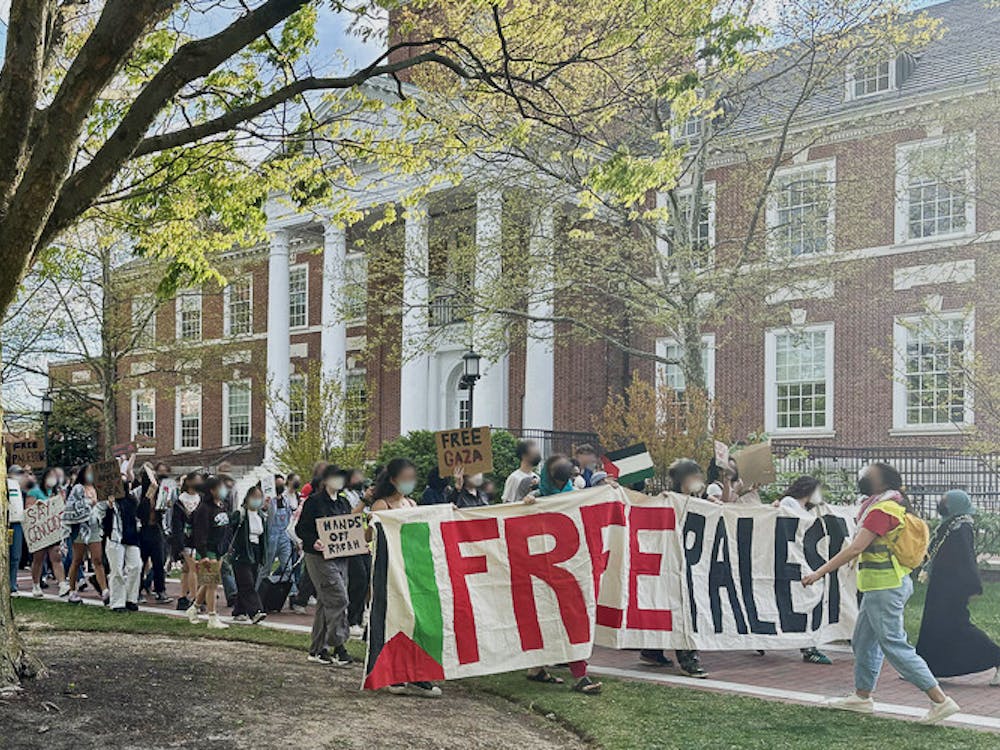Over the past few months contract workers employed at the University have been caught in a battle for higher wages, greater job stability and equal housing benefits.
On Thursday, Dec. 1, the Hopkins chapter of Students for a Democratic Society (SDS), along with labor unions Unite Here Local 7 and SEIU 32BJ, held a “Forum for Equality” to discuss the union’s next steps and inform the student body.
The two major contract companies on campus are Bon Appétit, which employs food service workers, and Allied Universal, which employs the security guards commonly known as Hop Cops.
Over the summer, the University reviewed its contract with Allied Universal and opened up the bidding process for the new contract to non-union companies. However after backlash from students and workers, the University eventually renewed its agreement with Allied Universal.
Contract employees, who work on campus but are not directly employed by the University, do not receive the same benefits as University employees do. Some believe this allows the University to discriminate against contract workers, many of whom are black.
The forum featured a panel of contract employees that was followed by a Q&A period with questioned posed by members of the Hopkins community.
Joel Andreas, an associate professor of sociology, welcomed everyone on behalf of the Hopkins chapter of the American Association of University Professors (AAUP).
“It’s really important we get the whole campus organized — everybody who works in everything, including the graduate students,” Andreas said. “We’ve got to get the University used to negotiating with the people that it hires.”
Andreas criticized the University’s relationship with its contract employees and highlighted the difficulty they had faced while negotiating with Hopkins.
“We’ve come together... to work with some of the student groups and other groups in the city to push Hopkins to change their policies,” Andreas said.
The first panelist, Bon Appétit employee Latifah Pearson, outlined Unite Here’s support for the Fight for 15, which is a national campaign advocating for a $15 minimum wage.

“Johns Hopkins can definitely afford it,” Pearson said. “The president of Johns Hopkins University received a raise from $1.5 million to $3 million per year. Fifteen dollars is nothing compared to that, when we’re the ones who deal hands-on with the students every day.”
Although the state of Maryland is working to pass a $15 minimum wage law by 2022, Pearson stressed that in six years, with the rising cost of living, $15 will be worth less than it is now.
Jonathan Hutt, an employee of Allied Universal and member of the SEIU 32BJ union, spoke about the fight for job stability.
He said that if the University decides to switch contractors, current employees would be in danger of losing their jobs.
He cited a case at The Peabody Conservatory several years ago when a new company came in and replaced the contract employees with their own. The Union believes that the University should require new companies to retain previous workers.
A third panelist, Bon Appétit worker Robin Gaines, brought up an incident where Director of Dining Services Bill Connor wanted to have “Johns Hopkins” written on employees’ jackets instead of “Bon Appétit.”
“If it’s a big deal about the logo on the jackets, then I feel as though we’re Johns Hopkins. I want those same benefits,” Gaines said. “I want the same benefits as the Johns Hopkins employees. I want a better house. I want a better neighborhood. I want job stability; I want $15 or more. I want a better way of life, period.”
Peter Sabonis, a member of the Baltimore Housing Roundtable, discussed the University’s Live Near Your Work program and the possibility of implementing it for contract employees.
Through this program, Hopkins employees are given a $35,000 grant for buying a home in neighborhoods close to campus, which have higher property values than other parts of Baltimore.
“We want the opportunity to maintain some affordable housing in those communities that are essentially gentrifying,” Sabonis said. “The idea is to carve out a section of the housing market that is not subject to gentrification.”
He explained that Hopkins is unlike other employers, since the University is an active developer that owns city property. Sabonis mentioned alternative models to help prevent sections of the housing market from gentrifying.
“We also want the opportunity to maintain some affordable housing in those communities that are essentially gentrifying,” he said. “And the way to do that is through things like community land trusts, shared equity models, limited equity co-ops.”
Andreas criticized elements of the University’s benefit plan, comparing the health insurance he receives to that of his wife, who is in a union at a Baltimore public school.
“Even though Hopkins has a hospital, even though I go to the Hopkins doctors, it still has a much bigger co-pay, much bigger deductibles,” Andreas said.

During the Q&A session, Sabonis noted that there is an environmental component to providing contract workers with nearby affordable housing. The further an employee lives from his or her workplace, the more energy is expended during the commute.
“If Hopkins cares about being environmentally responsible and being a green campus, you want your workers to live near where they work,” Sabonis said.
One audience member said that giving someone money to buy a house, as the University does through its Live Near Your Work program, shows that you’re investing in that person and that you want a long-term relationship. He argued that the University should be compelled to invest in its contract employees too.
After the Q&A, Local 7 member Alberta Palmer thanked contract workers for coming to the forum and commended them for their courage.
She recognized and thanked the students in attendance and reminded the audience that the Union would be petitioning in front of Charles Street Market on December 7 and 8 to get more students involved.
“This is not going to be an easy fight... we can’t back down, we’ve got to make sure they back down,” Palmer said. “We’ve always, always been stronger together. We’ve always been at our most powerful when we stand together.”
Students who attended the forum showed genuine curiosity for many of the concerns that union members addressed.
“I’m just generally interested in social issues, social policy, and I want to learn more about the issue, which is why I’m here,” freshman Alex Walinskas said. “I agree with the fact that... most of these contracted positions are filled by African Americans, and that puts the University in a discriminatory situation.”
Senior Chase Alston, a member of the Hopkins Chapter of Students for a Democratic Society (SDS) and the Black Student Union (BSU), shared Walinskas’ perspective.
“In general, a lot of issues we talk about in those two groups [are] black labor issues,” she said. “Labor issues are something that need to be paid attention to. The fact that the majority of the people that are working for this institution are black is an important issue that students should be caring about, but also that the University should care about.”
Derek Schilling, president of the Hopkins chapter of the AAUP and professor in the Department for German and Romance Languages and Literature, hoped to gather information about contract employees’ working conditions.
“I’m interested in seeing what kinds of issues are coming up through employees at the University,” Schilling said. “[And] disseminating widely the information so that those of us who are fortunate enough to be employed as lecturers and faculty members know exactly what the living conditions are for our staff.”
Walinskas highlighted how important it is for students to remain involved.
“As students who are paying to go here, we should have a say particularly when it does affect the wellbeing of people who are working in this institution,” Walinskas said. “So at the very least, students should stay informed on the matter.”
Alonzo Mitchell, a cashier at Charles Street Market, echoed how important it is to remain informed.
“I think students should know all of what’s going on here on campus,” Mitchell said. “And I think it’s very important for students to come out to these meetings so they can be... more aware of what’s happening.”
Mitchell noted that, while he was happy with his employment overall, he was disappointed in the disconnect between contract workers and the University.
“I’ve been here for 36 years now. It’s really good, I love working here; It’s like a family, and it helps me all the way around,” he said. “The negative is that we’re not more connected with the University. I think it would be more helpful if we were.”
The forum ended on an optimistic note, with participants feeling encouraged by the sense of unity and support among students, faculty and contract employees.
“I think it was a lot of affirmation in terms of knowing that it’s not just me, knowing that it’s everybody as a united front,” Alston said.
Hutt shared Alston’s hopeful outlook.
“If we continue to have these meetings... we can get things done because it shows strength,” he said. “If we do this, if we show them how strong we are, then they’re not going to put up a fight against us.”

















Please note All comments are eligible for publication in The News-Letter.